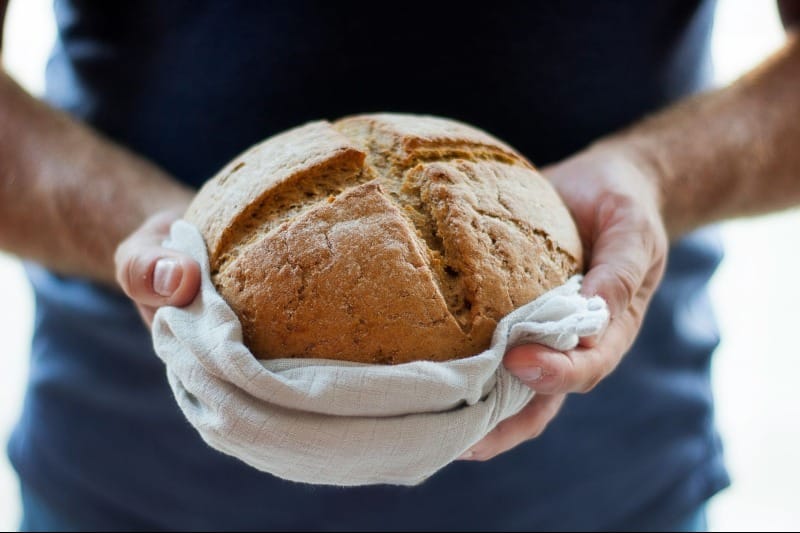In a surprising twist to conventional dietary wisdom, a doctor's recommendation to freeze bread before consumption has sparked interest among health-conscious individuals. This simple kitchen hack may offer unexpected benefits for your health and well-being.
Key Takeaways:
- Freezing bread can lower its glycemic index, potentially improving blood sugar control.
- The process creates resistant starch, which may boost gut health.
- Frozen bread, when toasted, could lead to fewer calories absorbed by the body.
- This method may help reduce food waste by extending bread's shelf life.
- Experts suggest this technique could be particularly beneficial for those managing diabetes or weight.
Introduction
We've all been there – buying a fresh loaf of bread only to watch it go stale or moldy before we can finish it. But what if freezing your bread could not only help it last longer but also make it healthier? A recent viral video by a doctor has brought attention to this intriguing possibility, suggesting that popping your bread in the freezer before eating it might have some unexpected health benefits.
The Science Behind Freezing Bread
Understanding Starch and Digestion
To understand why freezing bread might be beneficial, we need to look at how our bodies process starch. Bread, like many other carbohydrate-rich foods, contains starch – a type of carbohydrate that our bodies break down into sugar during digestion. This breakdown can cause a rapid increase in blood sugar levels, which isn't ideal, especially for people with diabetes or those watching their weight[2].
The Magic of Resistant Starch
Here's where the freezing comes in. When bread is frozen, cooled, or reheated, some of its starch transforms into what's called "resistant starch." This type of starch resists digestion in the small intestine, which means it doesn't get broken down into sugar as quickly[3]. As a result, your body absorbs fewer calories, and your blood sugar doesn't spike as dramatically[6].
Health Benefits of Freezing Bread
Improved Blood Sugar Control
One of the most significant potential benefits of eating frozen and reheated bread is better blood sugar control. Studies have shown that this process can reduce how much bread spikes blood sugar by up to 31 percent over two hours[6]. This could be particularly beneficial for people with diabetes or those at risk of developing the condition.
Boosting Gut Health
Resistant starch doesn't just pass through your system – it becomes food for the good bacteria in your gut. These bacteria ferment the resistant starch, producing short-chain fatty acids that can improve gut health[1]. A healthy gut is linked to numerous benefits, including better immune function and even improved mood.
Potential Weight Management Aid
Because your body absorbs fewer calories from bread that's been frozen and reheated, this method could potentially aid in weight management. While it's not a magic solution for weight loss, every little bit can help when you're trying to maintain a healthy weight[5].
How to Freeze and Use Your Bread
Freezing Tips
- Slice your bread before freezing for easy portioning.
- Use airtight containers or freezer bags to prevent freezer burn.
- Label your bread with the date to keep track of freshness.
Thawing and Using
- Toast frozen slices directly from the freezer for best results.
- If making sandwiches, assemble them in the morning with frozen bread – they'll be perfect by lunchtime[4].
- For larger portions, thaw bread at room temperature or in the refrigerator.
Beyond Bread: Other Foods That Benefit from Freezing
The benefits of freezing aren't limited to bread. Other starchy foods like pasta, rice, and potatoes can also develop resistant starch when cooled or frozen and reheated. This means you could potentially make your entire meal more gut-friendly and blood sugar-friendly by incorporating this technique[5].
Considerations and Caveats
While the potential benefits of freezing bread are exciting, it's important to remember that this isn't a cure-all for dietary issues. Here are a few things to keep in mind:
- Quality matters: Freezing won't make unhealthy bread healthy. Choose whole grain options for maximum nutritional benefit.
- Portion control is still important: Even if the bread is slightly lower in calories, overeating can still lead to weight gain.
- Individual responses may vary: While studies show general trends, everyone's body is different. Pay attention to how your body responds.
Expert Opinions
Nutritionists and health experts are cautiously optimistic about this trend. Dr. Sarah Berry, a nutrition scientist at King's College London, notes that while the research is promising, more studies are needed to fully understand the long-term effects of regularly consuming frozen and reheated bread[6].
Conclusion
Freezing your bread before eating it might seem like an unusual step, but the potential health benefits make it worth considering. From better blood sugar control to improved gut health and potential weight management benefits, this simple kitchen hack could be a valuable addition to your healthy eating toolkit.
Remember, though, that freezing bread is just one small part of a healthy diet. It's not a replacement for eating a balanced diet rich in fruits, vegetables, lean proteins, and whole grains. As always, if you have specific health concerns or conditions, it's best to consult with a healthcare professional before making significant changes to your diet.
So, the next time you buy a loaf of bread, consider giving your freezer some extra work. Your gut, your blood sugar, and possibly your waistline might thank you for it.
Citations:
[1] https://wearegoodinbread.com/benefits-of-freezing-bread/
[3] https://www.youtube.com/watch?v=HYZO-AktTeg
[4] https://www.newsweek.com/doctor-shares-why-you-should-freeze-bread-before-consumption-1938412
[5] https://www.gowinglife.com/why-you-should-freeze-and-toast-your-bread/
[6] https://www.sciencealert.com/does-freezing-bread-make-it-any-healthier-for-you-an-expert-explains
[7] https://www.eatyourbooks.com/blog/2024/07/20/why-freezing-your-bread-could-make-it-healthier














Member discussion